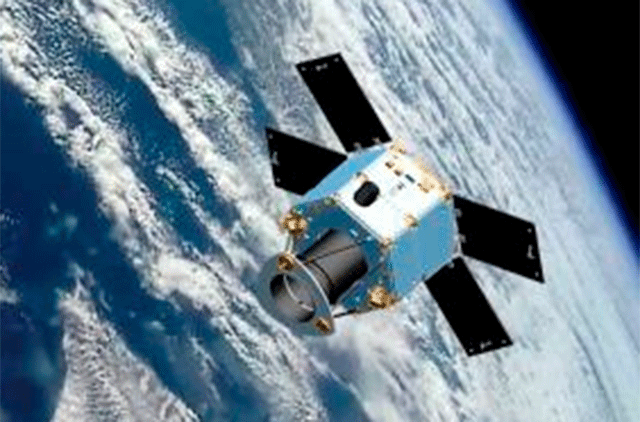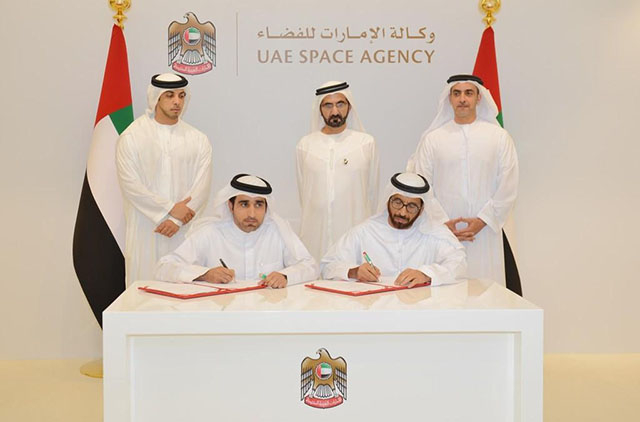
As children we grew up acknowledging that only certain countries with superpowers were in control of space. Our dreams of having Emirati astronauts were close to impossible.
I remember having a magnet of Apollo 13 on the fridge at home when I was a child dreaming of being part of a mission to discover the unknown.
The thought of space gave me hope of the infinite potential that we can reach. That dream diminished with time only to be reignited twenty years later!
In July 2014, His Highness Shaikh Khalifa bin Zayed Al Nahyan, President of the UAE, announced that we are officially entering the global race in exploring space through the creation of the UAE Space Agency.
The announcement was then followed with another mind-blowing statement on sending the first Arab probe to Mars to commemorate the UAE’s 50th anniversary in 2021. The idea that the UAE would ever enter the space race never crossed my mind.
The unexpected has occurred and I was excited beyond comprehension.
This isn’t the UAE’s first encounter with space as it has made remarkable advancements in satellite technology in the past decade.
However, launching satellites into orbit is one thing; and sending a probe to Mars is a different matter altogether.
The UAE’s step in embarking such a challenge proposes a question on the reasons the UAE is interested in space.
His Highness Shaikh Khalifa bin Zayed Al Nahyan, President of the UAE, explained: “to build Emirati technical and intellectual capabilities in the fields of aerospace and space exploration, to enter the space industry, and to make use of space technology in a way that enhances the country’s development plans”.
Only nine other countries currently have a space programme with a mission to explore the red planet. These countries have had ample of time to plan, design, and launch their space missions.
The UAE nevertheless, promises it will deliver its ambitious plan in only seven years. The delivery of such a massive project in what is considered a tight timeline might oppose one of the many challenges that lay ahead.
His Highness Shaikh Mohammed bin Rashed Al Maktoum, Vice President of the UAE and Ruler of Dubai, justified undergoing the difficult challenge: “We chose the epic challenge of reaching Mars because epic challenges inspire us and motivate us. The moment we stop taking on such challenges is the moment we stop moving forward.”
Exciting challenge
The newly established UAE Space Agency is tasked with supporting a sustainable knowledge-based economy, contributing to the diversification of the economy, and raising awareness on the importance of the space sector.
The Mars mission is one strategic project that will aid in achieving some of the objectives set.
This exciting project will encourage building a strong base of space professionals; it will instigate the establishment of a solid research and development programme in the areas of sciences and technology, and will initiate strategic international partnerships with experts in the field.
The space agency needs to take key critical steps in order to achieve its goals. It is through the influence and persuasion of its key stakeholders who include the public, academia and industry.
The UAE’s participation in space is a long-term plan aimed at developing its national human capital through academia and industry with a focus on innovation in sciences and technology, to create an aerospace sector that is going to add value to humanity. Consequently, creating awareness becomes key. The public needs to understand what space explorations entail, how it will add value, and the reasons the UAE is participating in such endeavours.
The UAE Space Agency will have to create a baseline of the current knowledge to realize the gaps. It is only through the understanding of the current and future plans of other space agencies, will the UAE be able to determine its area of focus and where it can add real value.
Educational development is vital in creating a national repository of space scientists, engineers and professionals. Therefore, the space agency will have to influence academia to allow for the adaptation of new curriculums, and research and development programs that will inspire and create interest in space. The results of such initiatives will be having a pool of high skilled Emirati professionals in space.
The industry will need to extend its support by allowing the internship and training of graduates in their entities. This will build human capital and capability that is fundamental in supporting future space plans.
It is unavoidable that the UAE will require key partnerships with global players to fill out the current challenges in its national space sector. However, when planned and executed correctly it will allow for valuable knowledge transfer to our future space experts.
As we celebrate our 43rd anniversary of achievements, I am reminded that nothing is impossible under the flagship of our great leadership. I am reminded that “infinity and beyond” can be achieved when fuelled with passion for the country. I am also reminded that the sky is no longer our limit, the universe is.
Shaikha Al Maskari is an Emirati writer on social affairs from Abu Dhabi. You can follow her on twitter: http://www.twitter.com/uaeyah










